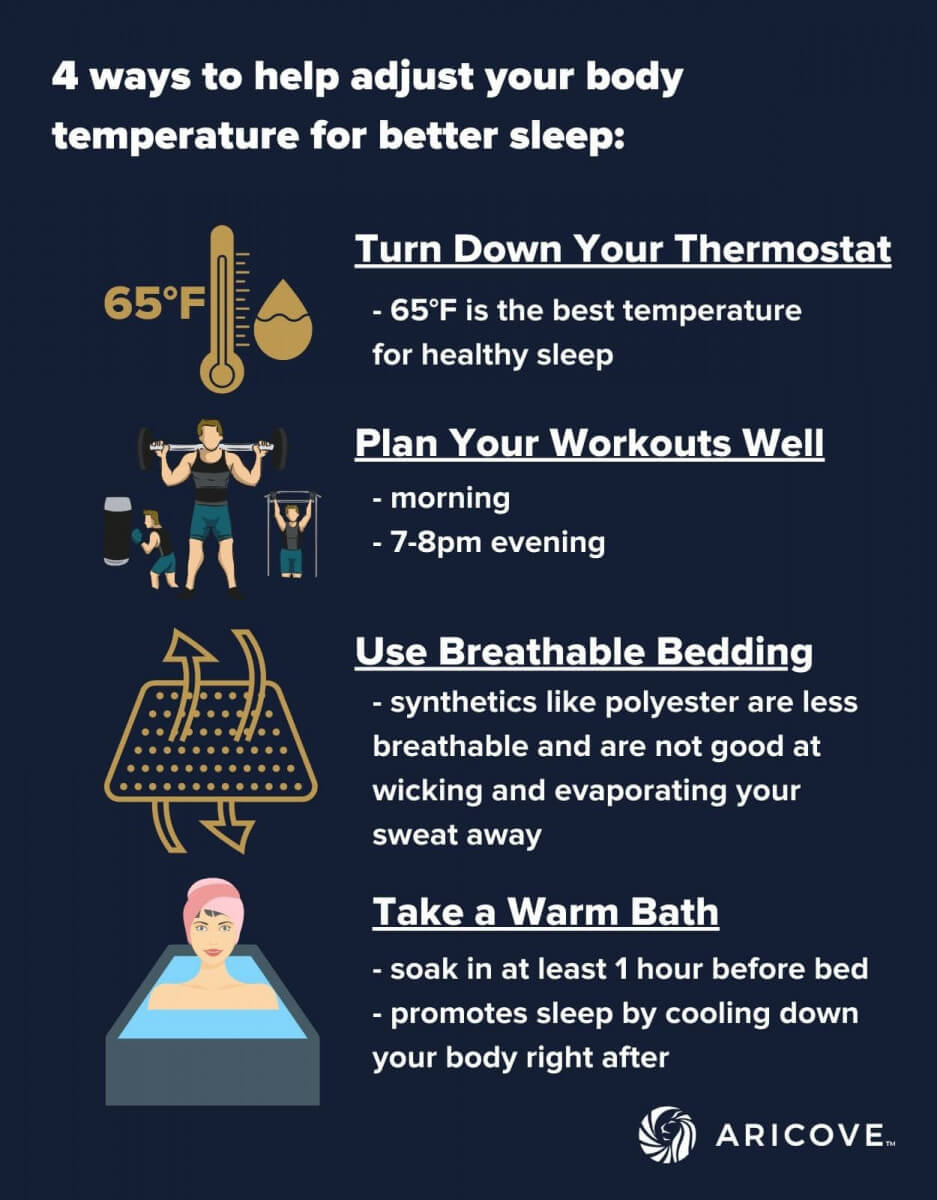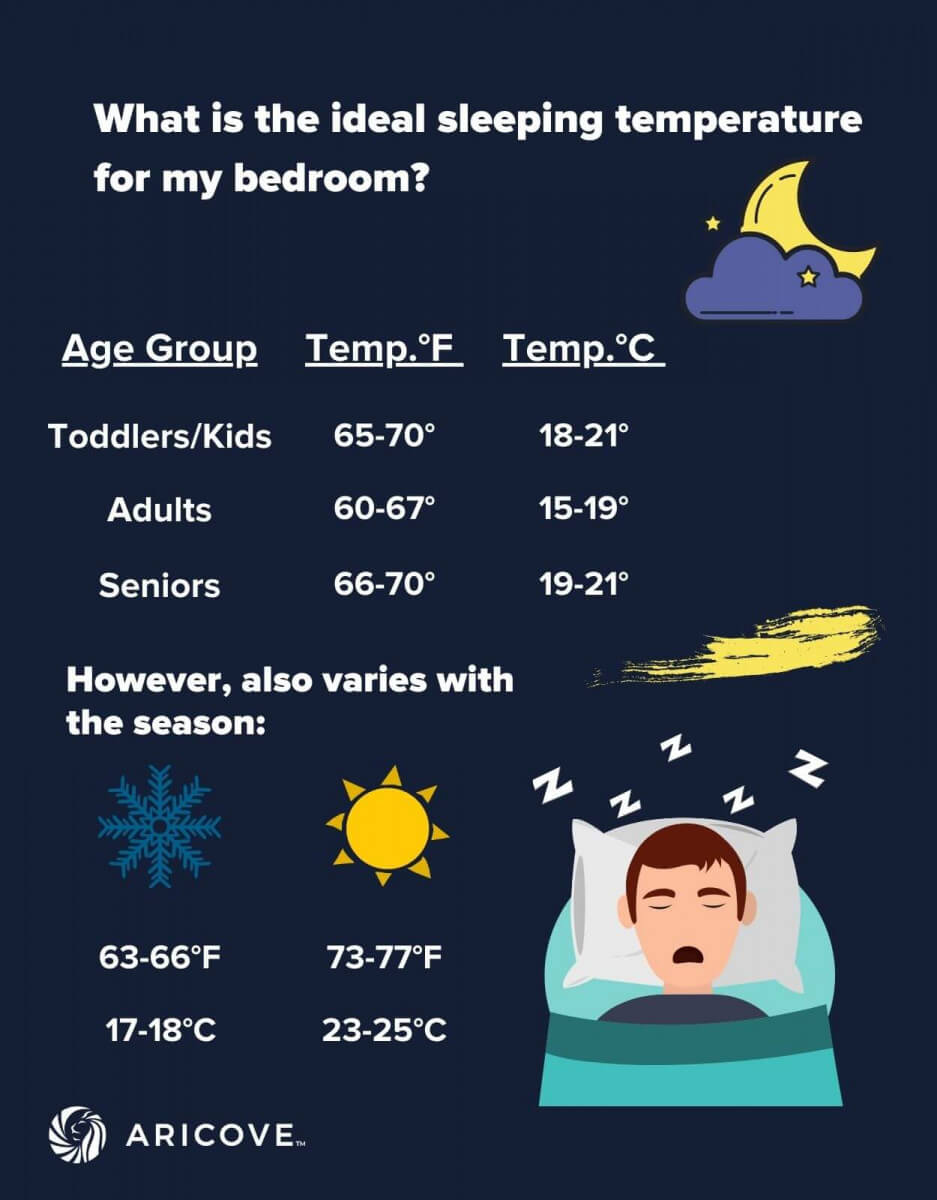- Why is Sleep Quality Important?
- The Relationship Between Sleep Quality and the Optimal Temperature for Sleeping
- The Ideal Sleeping Temperature: What the Research Has Found
- How Aricove Blankets Can Help You Achieve the Most Comfortable Temperature for Sleeping
Most of us know that sleep is important. After all, research from the National Sleep Foundation recommends that many adults get 7 to 9 hours of sleep per night. Another consideration, in addition to the total amount of sleep a person gets, is whether this sleep is of sufficient quality. In general, sleep quality is rated higher when people feel rested upon waking, have limited tiredness throughout the day, and experience fewer awakenings during the night. If you are experiencing poor sleep, sleep quality improvement can help you to feel more rested, and there are several ways to achieve this goal. One method for promoting optimal sleep quality is through maintaining an ideal sleeping temperature.
Why is Sleep Quality Important?
Before diving into the relationship between sleep quality and the optimal temperature for sleeping, it is helpful to understand the significance of sleep quality. Sleep quality improvement is an important consideration if you are feeling tired throughout the day. Even if you are logging a total of 8 hours of sleep per night, if you wake constantly throughout the night or have trouble falling asleep at the start of the night, chances are that you are not feeling your best in the morning. As time goes on, poor sleep quality can actually negatively affect your health. In fact, a new study in the Journal of Sleep Research shows that sleep quality is strongly linked to health, and especially mental health. Sleep quality improvement can therefore help you to avoid negative consequences, such as depression or physical ailments, arising from poor sleep.
The Relationship Between Sleep Quality and the Optimal Temperature for Sleeping
Sleep quality impacts your health and wellbeing, and you may be able to achieve sleep quality improvement by finding the ideal sleeping temperature. If you are too hot or too cold, you may find yourself waking throughout the night due to discomfort, which can negatively affect sleep quality. You may also have difficulty falling asleep at the start of the night if the temperature leaves you feeling uncomfortable, leading to less total sleep as well as tiredness upon waking in the morning.
The most comfortable temperature for sleeping can prevent you from tossing or turning at bed time and throughout the night, which has been proven in scientific studies that show that being too hot can increase wakefulness throughout the night. Without the use of appropriate bedding, being too cold can also interfere with sleep.
Another consideration when determining the ideal sleeping temperature is that research shows that sweating and rapid changes in temperature can disturb sleep. This means that it is important to select sleepwear and bedding that keeps you at an optimal temperature for sleeping throughout the night.
All of this may leave you wondering, “What is the best temperature for sleeping?” To determine this, it is helpful to turn to what the research says about the ideal sleeping temperature.
The Ideal Sleeping Temperature: What the Research Has Found
Several studies have sought to determine the ideal sleeping temperature to help people improve their sleep quality. One study, published in 2012, found that the best temperature for sleeping was around 73 degrees Fahrenheit. At this temperature, people took the least amount of time to fall asleep, and they spent more time in deep sleep, suggesting that 73 degrees maybe the optimal temperature for sleeping.
A review of several studies concerned with the ideal sleeping temperature was published in a 2017 report. According to findings, the World Health Organization recommends a minimum temperature of about 64 degrees when sleeping. Additional research shows that when the temperature is above 75 degrees, people experience sleep disturbances.
The optimal temperature for sleeping may also vary based upon the time of the year. For instance, some research suggests that a temperature of 63 to 66 degrees is appropriate during the winter months, whereas temperatures of 73 to 77 degrees may be comfortable during the summer.
While there does seem to be some variation in the ideal sleeping temperature found in studies, what experts seem to agree on is that extreme temperatures can disrupt sleep. Being too hot or too cold can make it harder to fall asleep and stay asleep, which will have a negative effect on sleep quality. Finding a temperature that is comfortable for you, as well as a sleep environment that keeps you comfortable throughout the night, is important for restful sleep.
How Aricove Blankets Can Help You Achieve the Most Comfortable Temperature for Sleeping
It is difficult to determine the exact optimal temperature for sleeping, but remaining at a comfortable temperature throughout the night can lead to sleep quality improvement. It is important to stay warm enough throughout the night without getting so hot that you experience sweating and overheating, which can disturb your slumber.
One way to maintain an ideal sleeping temperature for the duration of the night is by choosing high-quality bedding. This is where Aricove can help. Our cooling weighted blanket offers a breathable structure, and they provide natural moisture wicking for hot sleepers. Made from premium bamboo, they also ensure excellent thermoregulation, allowing you to stay at that most comfortable temperature for sleeping all night long. In addition to promoting the ideal sleeping temperature, Aricove is proud to offer a smart weight distribution in our weighted blanket for adults and kids, providing gentle stimulation to the body’s pressure points to calm the nervous system.


 United States (USD $)
United States (USD $)

